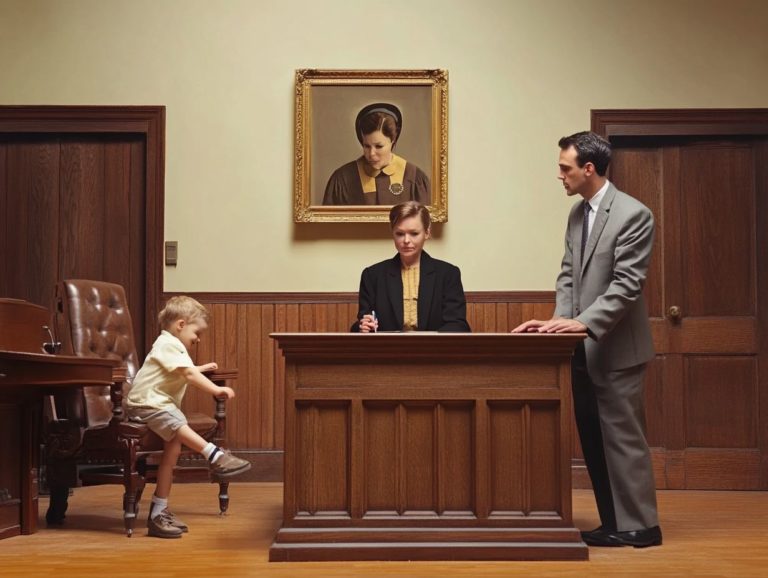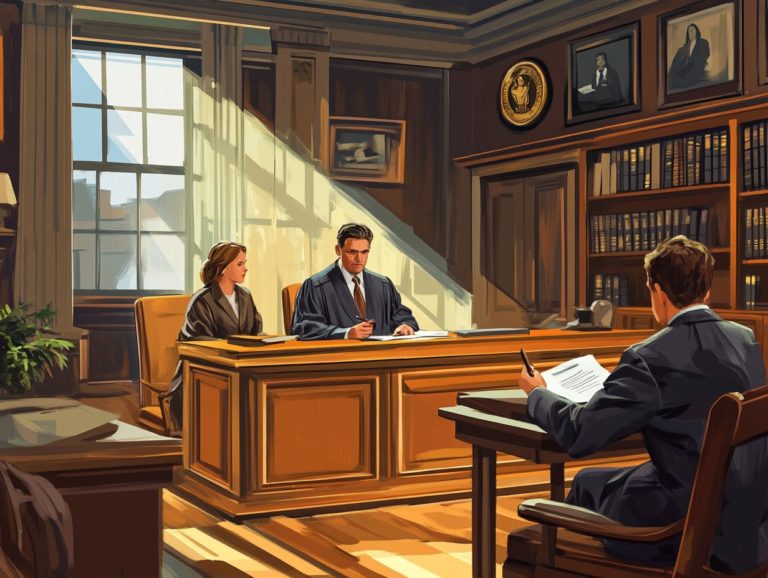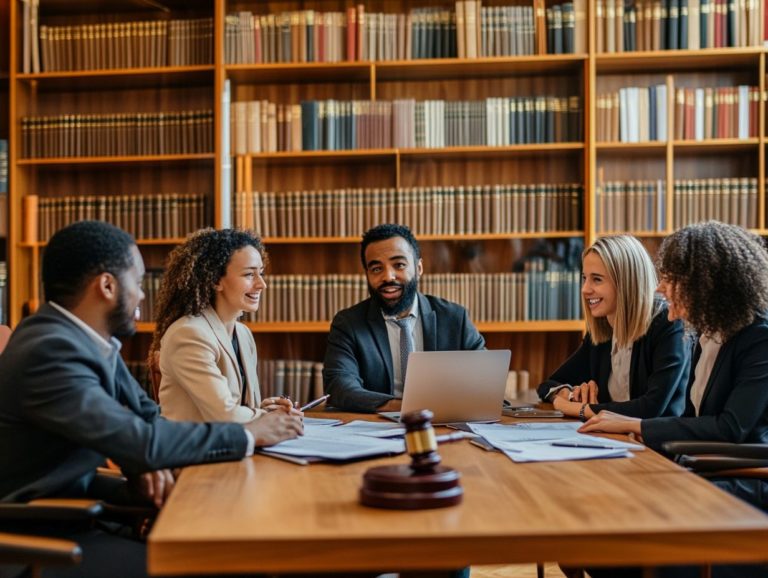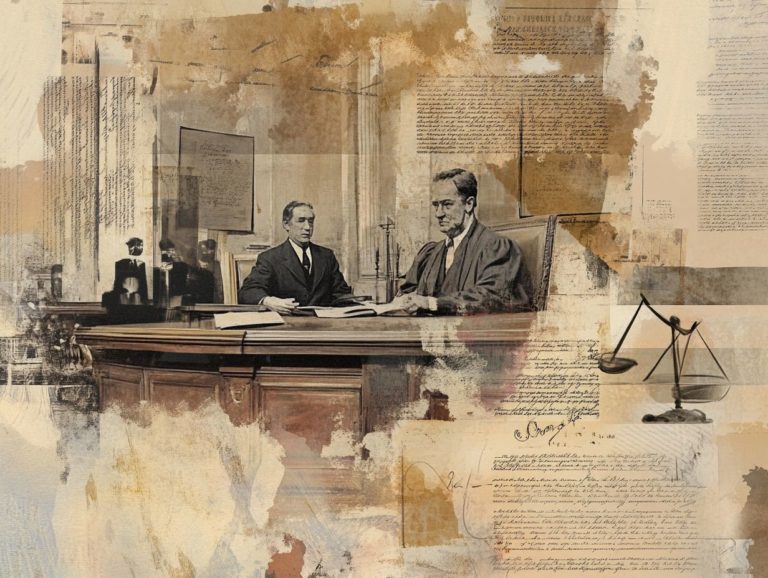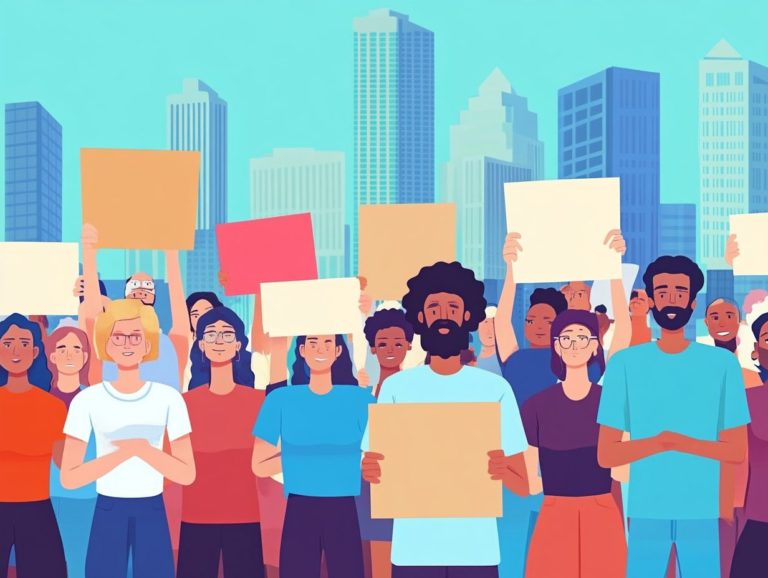Rights of the Accused: A Global Perspective
The rights of the accused are crucial in justice systems worldwide. They ensure fairness and protect individuals from wrongful treatment.
This exploration delves into the evolution and significance of these rights, tracing their historical journey from ancient civilizations to modern legal frameworks.
By examining diverse practices across various countries, you will uncover the common rights prevalent in most legal systems. You will also grapple with the challenges and controversies that arise.
Efforts by international organizations and ongoing legal reforms aimed at protecting these essential rights will be highlighted.
Join us in exploring this crucial aspect of human rights and justice!
Contents
- Key Takeaways:
- The Concept of Rights of the Accused
- Historical Evolution of Rights of the Accused
- Rights of the Accused in Different Countries
- Common Rights of the Accused
- Challenges to Rights of the Accused
- Efforts to Protect and Promote Rights of the Accused
- Frequently Asked Questions
- What are the basic rights of the accused from a global perspective?
- Are the rights of the accused the same in every country?
- What is the purpose of providing rights to the accused?
- Can the rights of the accused be limited or restricted?
- Do all accused individuals have the same rights?
- What happens if the rights of the accused are violated?
Key Takeaways:
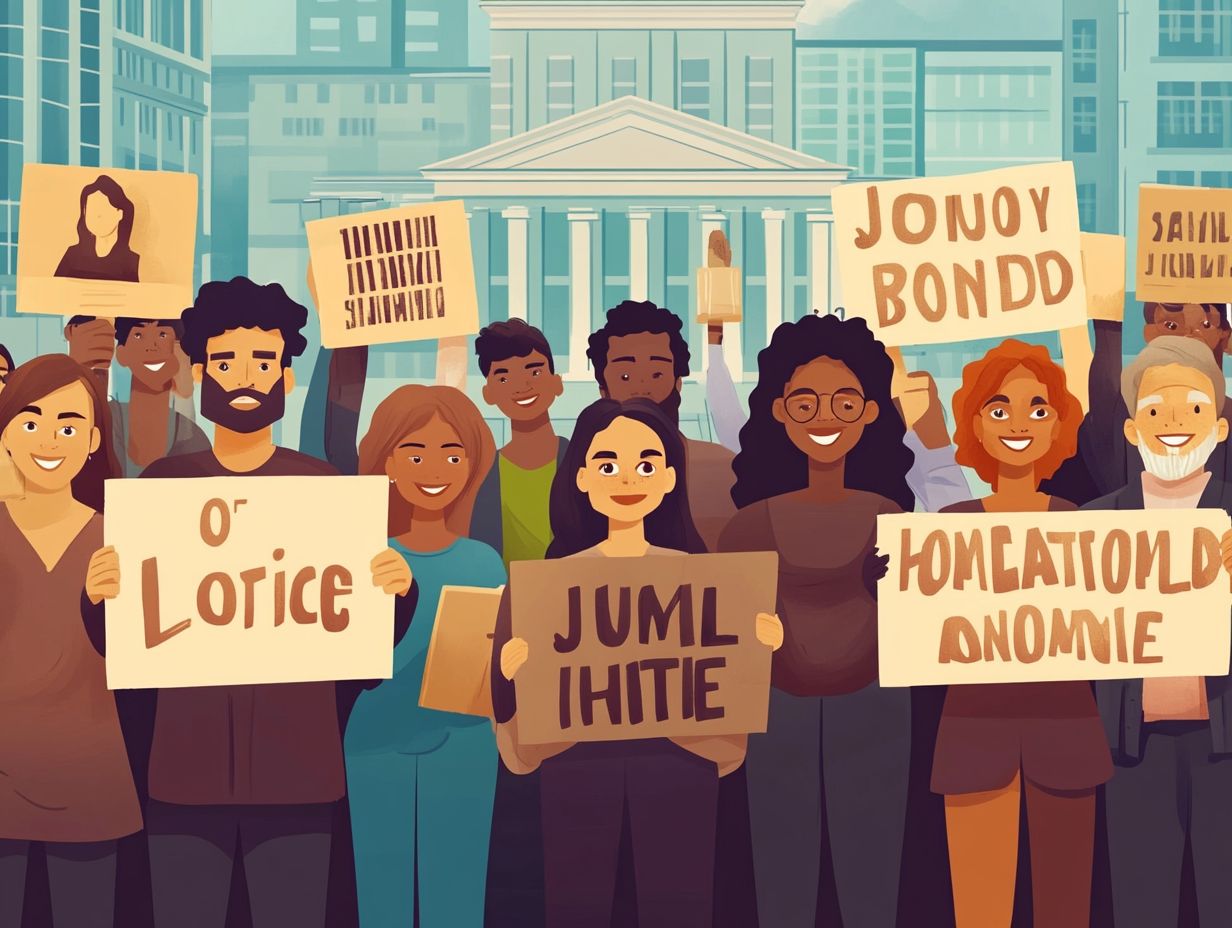
Rights of the accused are fundamental rights that protect individuals accused of a crime and ensure a fair legal process. These rights have evolved over centuries and vary across countries, but most legal systems guarantee key rights such as the right to a fair trial and the presumption of innocence. For a deeper understanding, explore the rights of the accused: common violations.
Despite efforts to protect and promote these rights, challenges and controversies surrounding them still exist, highlighting the need for ongoing advocacy and legal reforms.
The Concept of Rights of the Accused
The rights of the accused represent a crucial framework of fundamental rights recognized internationally as vital for ensuring a fair trial and upholding justice in criminal legal systems, as highlighted in the key takeaways on the rights of the accused.
These rights form the bedrock of democracy, shielding individuals accused of crimes from governmental abuse and ensuring they receive equitable treatment under the law.
Protecting these rights enables individuals to defend themselves in court and facilitates the pursuit of truth. They also serve as a bulwark against discrimination and bias in legal proceedings.
Defining the Term and Its Importance
The rights of the accused encompass critical legal protections and privileges that ensure you are treated fairly when facing criminal charges, forming the foundation of a fair trial. For a deeper understanding, check out the top 5 rights of the accused explained.
These rights include essential provisions such as the right to legal counsel, which guarantees you access to professional legal guidance. This levels the playing field against the extensive resources of the state.
The right to silence protects you from being forced to testify against yourself. Furthermore, protection against unreasonable searches safeguards your personal privacy and dignity.
Collectively, these rights prevent abuse within the justice system, creating an environment where the legal process remains transparent, equitable, and respectful of your inherent rights.
Historical Evolution of Rights of the Accused
The historical evolution of the rights of the accused unfolds through significant milestones that have profoundly shaped contemporary legal frameworks, including the role of ethics in rights of the accused.
Key events, such as the Nuremberg tribunals and the establishment of international human rights instruments like the Geneva Conventions and the International Covenant on Civil and Political Rights, stand out in this narrative.
This evolution mirrors society s increasing awareness of the essential nature of fair trial rights and the vital protection of individuals facing criminal accusations.
From Ancient Times to Modern Legal Systems
From ancient legal systems that often favored retribution over true justice, the rights of the accused have undergone remarkable transformations, evolving into modern frameworks that prioritize a fair trial and fundamental rights.
In early civilizations like Mesopotamia, laws such as the Code of Hammurabi were entrenched in strict punishment, frequently overlooking the rights of those accused of crimes.
Moving forward to the Roman Empire, the introduction of the Twelve Tables signaled a significant shift. These laws began to embrace concepts of equity and legal representation, altering the perception of accused individuals in the eyes of the law.
Today, this evolution continues with principles such as the presumption of innocence, meaning you are considered innocent until proven guilty, and the right to counsel, which are foundational in many democratic systems around the world.
This journey illustrates a growing recognition of human dignity and the pressing need for justice to harmonize with compassion.
Rights of the Accused in Different Countries
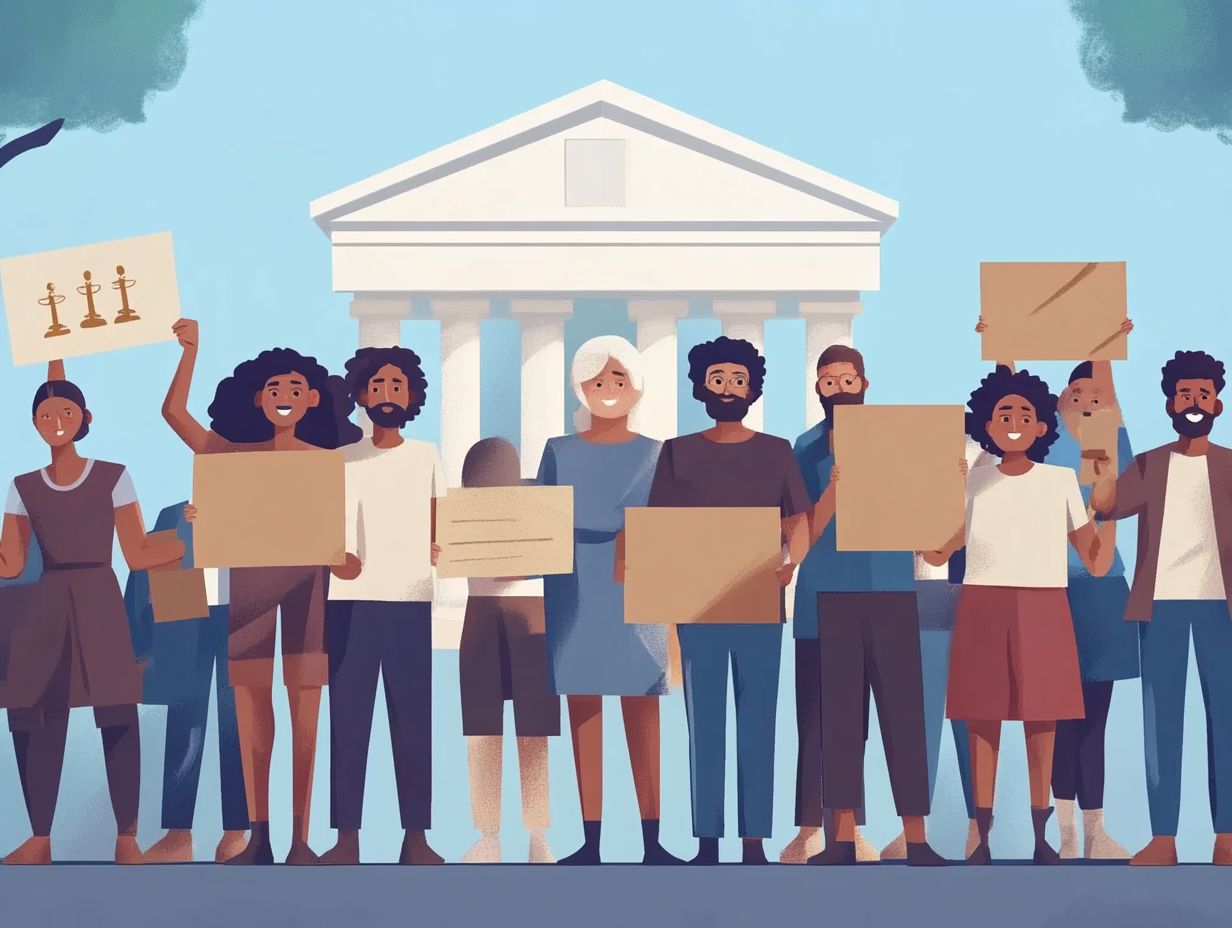
Countries have different rights for the accused. Each nation operates within its own legal framework, which may either uphold or challenge internationally recognized human rights, including the right to privacy and its implications for the accused.
These rights typically include fundamental principles such as the right to a fair trial, the option of trial by jury, and the provision for legal counsel representation.
Comparison of Legal Systems and Practices
A comparison of legal systems around the globe reveals notable discrepancies in how the rights of the accused are upheld.
Some jurisdictions align closely with international standards on fair trial principles, while others expose significant gaps. This divergence can profoundly impact legal outcomes and the broader perception of justice within societies.
In certain democracies, the presumption of innocence and the right to legal counsel are firmly established. This allows individuals to mount effective defenses.
In stark contrast, nations where political pressures or societal beliefs shape the legal framework may see accused individuals facing systemic biases, limited access to legal representation, or even arbitrary detention.
Case studies illustrate these variations vividly. They showcase the treatment of suspects in countries with militarized legal frameworks compared to those that employ restorative justice approaches.
The implications of these inconsistencies ripple far beyond the courtroom. They affect public trust in legal institutions and shape societal respect for human rights.
Common Rights of the Accused
Regardless of the differences in legal systems, you typically have certain fundamental rights. These include the right to a fair trial, access to legal representation, and essential judicial safeguards designed to uphold justice and equity.
Key Rights Guaranteed in Most Legal Systems
Key rights guaranteed in most legal systems include the right to silence, the right to a speedy trial, and the right to appeal. These are essential components designed to protect your position during legal proceedings.
These rights are not just formalities; they uphold justice and maintain the integrity of the judicial system.
The right to silence means you cannot be forced to provide evidence against yourself. This safeguards you against self-incrimination and promotes a more equitable legal process.
The right to a speedy trial ensures you won’t be left hanging in legal limbo. It helps avoid the erosion of your quality of life and mental well-being.
The right to appeal acts as a crucial safety net. It allows you to challenge decisions that may have been reached unfairly or involve procedural missteps.
Together, these rights play a fundamental role in ensuring that no one faces arbitrary judgment. They reinforce public trust in the legal system.
Challenges to Rights of the Accused
Despite the established rights of the accused, numerous challenges persist in the legal landscape.
These challenges include governmental abuses, discrimination and bias within legal proceedings, and the alarming rise of coercive policing tactics. Such issues undermine these fundamental protections.
Issues and Controversies Surrounding These Rights
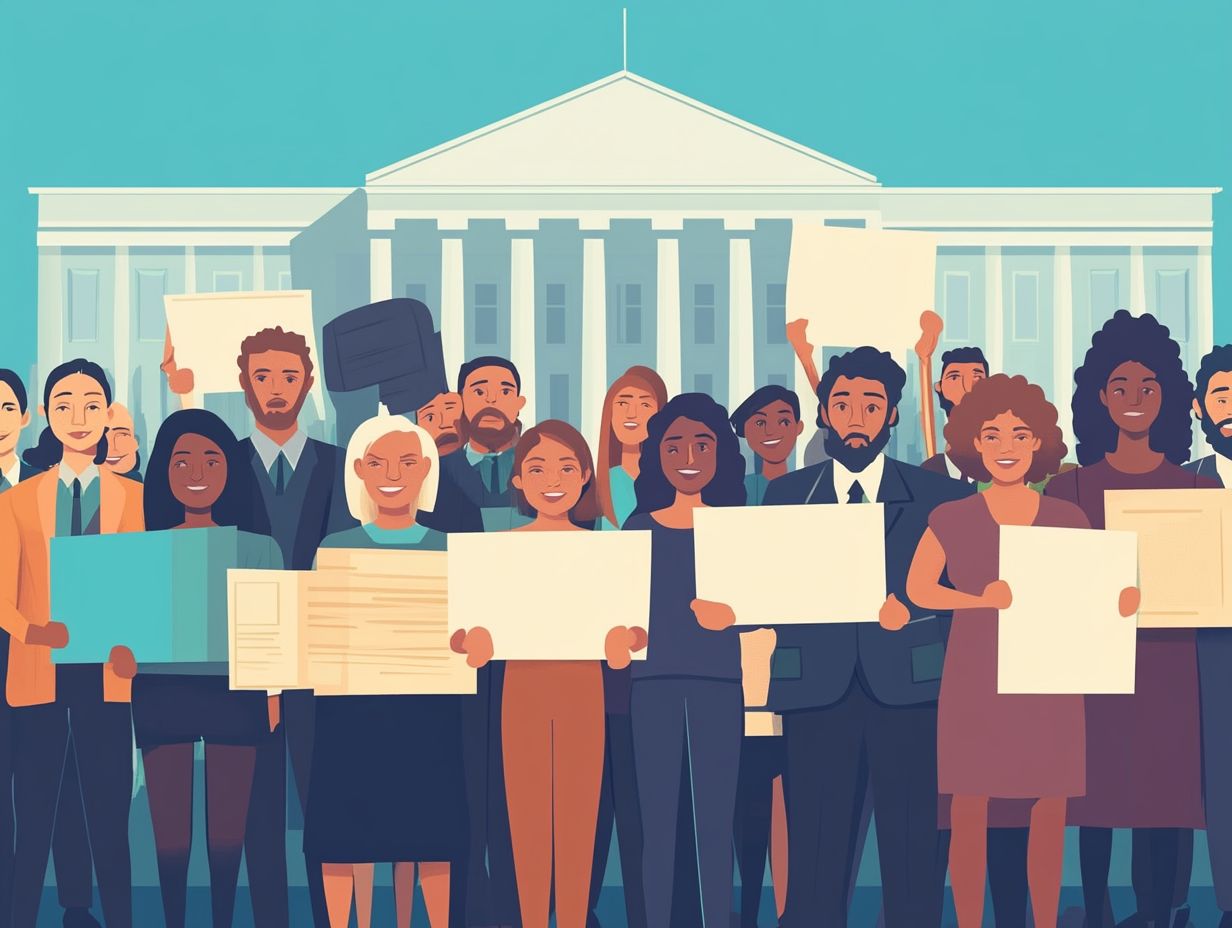
Numerous issues and controversies surround the rights of the accused, particularly concerning overcriminalization and the misuse of state power. Such misuse can lead to unjust outcomes.
As you navigate the complexities of an expanding legal framework, it becomes clear that individuals often find themselves ensnared in a tangle of regulations. These regulations can criminalize otherwise benign behaviors.
Take, for example, minor infractions like public intoxication or loitering. These seemingly trivial acts can lead to severe penalties, turning ordinary citizens into felons.
This overly aggressive legal approach disrupts personal lives and perpetuates stigma. It severely limits access to employment opportunities.
Public perceptions frequently drive these legal discussions. There is a growing advocacy for reform as awareness increases about the harmful effects of such policies on impacted populations.
This reality highlights the urgent need for reform now! It underscores the need for a balance that respects the rights of the accused while maintaining public order.
Efforts to Protect and Promote Rights of the Accused
Your efforts to protect and promote the rights of the accused are driven by international organizations, legal reforms, and movements dedicated to safeguarding these rights against abuse.
Your involvement in these initiatives helps uphold justice worldwide. This framework ensures accountability in legal systems.
International Organizations and Legal Reforms
International organizations and legal reforms play a crucial role in defending the rights of the accused. Entities like the UN International Criminal Tribunals and the Human Rights Committee lead the way.
These organizations focus on creating fair trial standards, ensuring everyone receives fair treatment under the law. Through their relentless advocacy, you can see a wave of legal reforms emerging globally, driving significant transformations in judicial processes.
For instance, countries like Germany and South Africa have implemented measures to boost trial transparency. This helps reduce the risk of wrongful convictions.
The impact of these international bodies is evident in the establishment of legal aid systems in developing nations. These systems help bridge the gap for those unable to secure adequate representation. Such reforms enhance legal protections and show a growing commitment to uphold human dignity within the justice system.
Frequently Asked Questions
What are the basic rights of the accused from a global perspective?
Globally, the basic rights of the accused include a fair trial, legal representation, the presumption of innocence, the right to remain silent, and protection from self-incrimination.
Are the rights of the accused the same in every country?
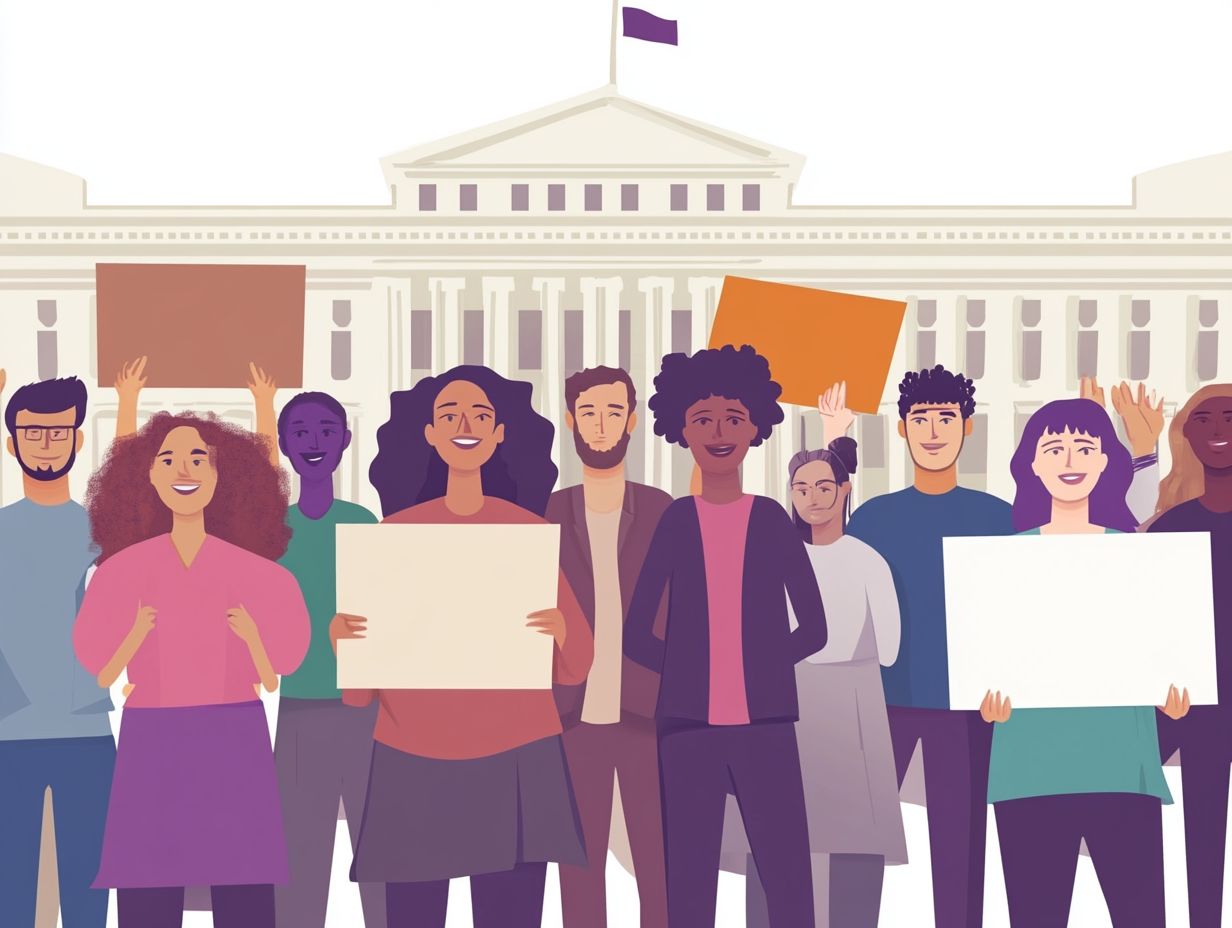
No, the rights of the accused may vary from country to country, guided by their respective legal systems and cultural values. However, certain fundamental rights are recognized and protected by international human rights instruments, such as the rights of the accused outlined in the Universal Declaration of Human Rights.
What is the purpose of providing rights to the accused?
The purpose of providing rights to the accused is to ensure they receive a fair trial and are not unjustly punished. These rights safeguard against potential abuse of power by the state and help protect the dignity and integrity of the accused.
Can the rights of the accused be limited or restricted?
Yes, the rights of the accused can be limited or restricted in certain circumstances, such as during a state of emergency or in cases of national security. However, any restrictions must be necessary and proportionate to the situation and must not violate fundamental human rights.
Do all accused individuals have the same rights?
Yes, all accused individuals have the same rights regardless of their ethnicity, religion, gender, or any other personal characteristics. These rights are universal and should be guaranteed to everyone, regardless of their background or social status.
What happens if the rights of the accused are violated?
If the rights of the accused are violated, they may file a complaint or appeal to a higher court. In some cases, they may also seek legal remedies or compensation for any harm or injustice caused by the violation of their rights.

